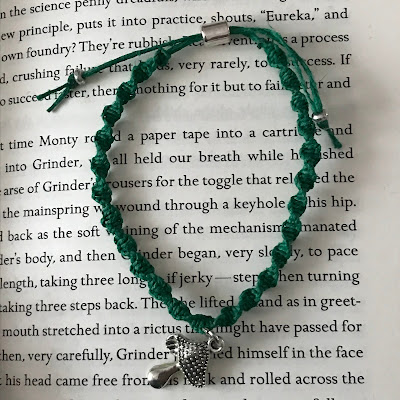It's been a hell of a month.
Murder by the Book: Mysteries for Bibliophiles: another collection of short stories published by the British Library Crime Classics, by authors well-known and forgotten. The stories were, for the most part, enjoyable. Some of the weaker ones highlight a problem with mystery short stories -- it takes a writer of great skill to create a satisfactory tale given there is little space for characterization and motive.
Interior Chinatown by Charles Yu: I absolutely loved this brilliant take on race relations. It's written in screenplay form, about Generic Asian Man who hopes his stint on the procedural show "Black and White" (get it?) will allow him to become Kung Fu Guy, movie star. It's bitingly satirical but also moving as it addresses the immigration history of Asians (and how they are never considered Americans no matter how long they have been here) and, most touchingly, the role of parenthood.
The Annotated Hobbit by J.R.R. Tolkien, annotated by Douglas A. Anderson: my paperback copy having long since fallen apart, I treated myself to this handsome book with the aforementioned annotations, essays on the creation and publication of The Hobbit, and oodles of illustrations by Tolkien himself and the illustrators of different translations.
Dreams Underfoot by Charles de Lint: I first read these short stories back in college? Law school? De Lint is considered a master of the urban fantasy subgenre; this first anthology shows the the development of his fictional city Newford (maybe Canadian, maybe American, maybe coastal, maybe not) and the various fairy denizens who are only rarely noticed by human residents. I had forgotten that some of these tales are straight up horror. I had not forgotten that de Lint has a chip on his shoulder about anyone one who lives a conventional life. Still, they are fun to read.
North Woods by Daniel Mason: another novel I loved. Taking place in western Massachusetts (where I grew up), it follows the history of a house originally built by a Puritan couple fleeing persecution and all the people who subsequently stay in that house, however briefly. Those people are all considered outsiders by society (some deservedly, most not), and Mason writes movingly about the peace they find in the house and its surrounding woods. It's fascinating to compare this to Richard McGuire's Here, which has the same concept but tells it in comic form.













































